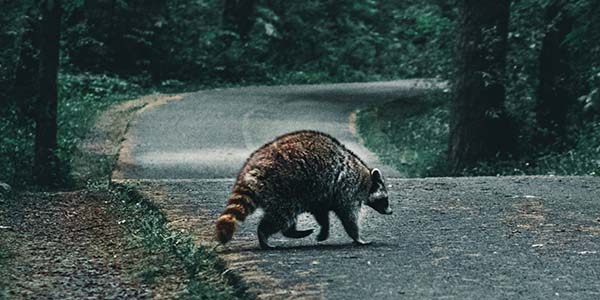Raccoons are very adaptable creatures, they can live almost anywhere that offers them food and shelter including urban areas or human properties as long as there is enough of both. Their habitat may include forests near water sources where they find plenty of plant-based foods for living on but they’re also known to adapt well if their natural habitats have been destroyed by deforestation or other activities humans do which cause raccoons to move into human communities instead. This article will discuss the various types of habitats raccoons love to call home.
Raccoon’s natural habitat
Raccoons are forest dwellers who prefer dense vegetation for shelter, however, they aren’t really very fussy when it comes to where they live. They will build a den and create raccoon families in places that have food, water, and shelter—and there are plenty of those types of habitats around North America! In the wild, raccoons generally enjoy living in hollow trees near rivers or other bodies of water but they’re also highly adaptable and will live in urban and suburban areas such as parks, farms, and even people’s backyards!
A raccoon’s natural habitat is in forested regions near water sources such as rivers or streams where they can find food to survive. These wild animals also thrive in marshlands, wetland forests, rivers, and wooded areas where they travel in packs to find sufficient food and shelter. They will usually live in dens they make themselves or use abandoned burrows of other animals, hollows of old trees, thick brush piles, riverbanks, rocky ledges, thickets, and rock crevices to provide shelter from predators as well as the rain or other bad weather conditions.
Raccoons in North America
Raccoons are found throughout North America, including Canada and the United States. They live in a range of habitats that may include woodlands, savannas, prairies, or even swamps which provide them with water sources to drink from as well as food sources. They also don’t mind living in urbanized areas such as cities where they frequently cross paths with people. Consequently, these habitats will either have a favorable or detrimental effect on the life expectancy of raccoons.
Urban raccoons
Urbanization has brought humans closer to wildlife so it’s no surprise raccoons often make their homes on people’s properties—especially if there is easy access to food sources like trash cans, bird feeders, bird eggs, backyard ponds, and pet foods!
Raccoons that are living in suburban and urban areas will usually find shelter in attics, under decks, porches, or sheds and become just a nuisance as they rummage through trash cans, damage property, and get involved in road accidents.

Raccoon dens
A raccoon’s den is usually made up of whatever materials are available at that time including leaves, twigs, and dry grass which they weave into a nest. During the winter season, raccoons would usually find themselves inside attics and if there isn’t enough material to make a proper den then raccoons may adapt your insulation into a den.
Denning habits: female vs. male raccoons
A female raccoon during the mating season would choose to live in dens inside tree cavities that are high off the ground. However, when they are rearing juveniles or during raccoon gestation, they tend to pick dens in the ground like hollow logs or burrows made by other wildlife.
A male adult raccoon on the other hand will have a number of dens and will move between these dens quite often. Male raccoons typically switch dens every day or every few days, while females tend to stay in one den the entire time.
What do raccoons live in?
Raccoons live in a variety of places depending on whether they are in suburban and urban areas or in the wild. In urban areas, they may live in attics or under decks because of easy access to food sources and shelter from bad weather conditions. Raccoons in the wild would live in dens found inside hollow logs, brush piles, or abandoned burrows of other animals.
Where do raccoons go in the winter?
During winter seasons, people wonder, “do raccoons migrate?” The truth is, unlike other animals that move to warmer locations during the winter, raccoons just stay in their dens where they will go into a deep sleep called torpor.
Do raccoons live in sewers?
Raccoons can sometimes be seen around sewers so people might wonder, “do raccoons live in sewers?” The answer is they don’t. Raccoons mostly use sewers and storm drains to get from one point to another and sometimes to forage food. Raccoons are known to scavenge food in sewers to survive.

Do raccoons live in trees?
While raccoons like to live in tree hollows and cavities, these animals don’t really live in treetops. Raccoons typically prefer to live on the ground in holes and burrows – although in urban areas they will climb trees and use tree branches as a sort of bridge to get onto roofs and into attics.
Where do raccoons live at night?
Raccoons are nocturnal animals so they’re usually out at night searching for food and water. Since they’re most active at night that is when homeowners will notice their presence in backyards, digging through trash cans for grub or rummaging through dumpsters.

Where do raccoons sleep during the day?
During the day raccoons sleep in their dens. They usually have several of these dens and move between them often – even during the daytime. It isn’t true that raccoons that move during the daytime are rabid raccoons! In most cases, they come out of their dens to search for food or because the den is destroyed.
In the wild, these dens could be at tree cavities or hollows, and sometimes they repurpose burrows by other animals. In suburban or urban areas, raccoons might sleep in their dens on abandoned vehicles and buildings, attics, beneath decks, porches, and in crawl spaces.

Why do raccoons come into homes?
Raccoons are known to enter homes in search of food, water, or shelter. Raccoons can easily take up residence in homes as they adapt well into human habitats and become completely fearless towards humans. They will not hesitate to enter a home through the pet door if it is available. Raccoons might also enter a house if there is easy access for them to get in. They will even make use of holes around the home where they can squeeze through and create their own den or nest inside your attic, under your deck, or porch area.
Removing raccoons in homes
Raccoons are not easy to remove once they make your home their dwelling ground. They have sharp claws and teeth that can cause serious injury to you when you try to evict them out from your property. They also carry diseases and viruses like rabies virus and parasites that can cause illnesses to you and your family.
If raccoons invade a home, the best thing to do is call pest control technicians who have experience dealing with these animals from an attic or crawl space entry point. They will use safe removal methods in order to prevent harm upon the critter when evicting them out of your property. Raccoons should not be handled by homeowners as they are wild animals that are dangerous when cornered. So it’s important to seek expert help in getting rid of their dens within your property.
You can prevent raccoons from coming into your home by using deterrents for wild animals and removing attractants such as unsecured trash cans and pet food bowls. You can also make your home less attractive to raccoons by using motion sensor lights and sprinklers that will startle them whenever they enter the property.
Professional Raccoon Removal
If you have a pesky raccoon that is entering your property and rummaging through your trash cans, you can call a professional animal removal company like us. At AAAC Wildlife Removal, we have the expertise and proper equipment to safely and humanely remove raccoons from your property, with no harm to them. We also have animal proofing solutions that will prevent wildlife from getting into your home in the future and keep away other problematic wild animals such as skunks, squirrels, and opossums.
It’s important to call an expert whenever you see a raccoon on or around your property so we can remove them humanely. Our trained technicians will also identify the entry points for raccoons to set up a permanent solution. Once the raccoon is evicted from your property, we will then set up a prevention plan to make sure that they do not re-enter the premises.
In summary
Raccoons are a very common urban animal because they adapt well to human habitats and become less fearful of humans over time. They live in a variety of habitats such as deserts, forests, and urban areas. Raccoons can be found in urban areas and neighborhoods where there is access to food sources like garbage cans or pet food left outdoors overnight.
And while they spend their daytime sleeping, at night they become active foragers looking for food outside of the den. Raccoons are excellent climbers so any kind of nook or cranny would be enough to make a good home for them – including your attic, crawl space under your deck/porch, etc. Removing these wild animals from your property can be dangerous and should only be handled by trained professionals.
Professional raccoon removal is the best way to get rid of them from your home or business because not only do they carry diseases but these animals are also very strong with sharp teeth and claws that could harm you if cornered, so it’s important to call experts who have experience in dealing with wildlife instead of trying to evict these animals yourself which could result in serious injuries.
Originally published on https://aaacwildliferemoval.com/blog/raccoons/where-does-a-raccoon-live




